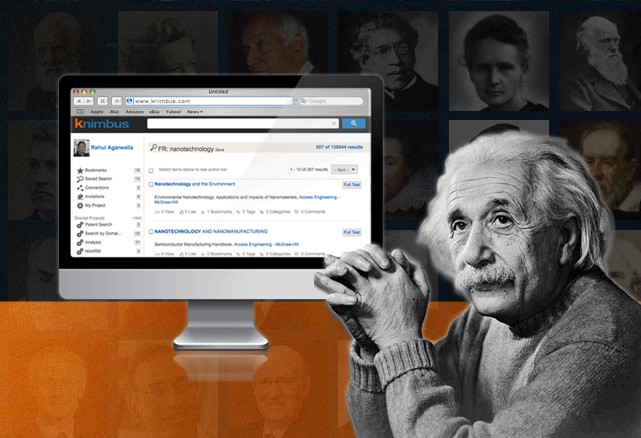Knimbus enables Web-based knowledge discovery, collaboration

Knimbus is an Indian company which was founded to address challenges faced by researchers when searching for information across multiple data sources, according to its founders Rahul Agarwalla and Tarun Arora. It aims to democratize information by connecting and enabling knowledge-based communities around the world.
The company's platform helps researchers find and access millions of journal articles, patents, and e-books. Users can tag, share, and discuss relevant content with their peers, and their activities create an information signal around the most relevant content and helps other users discover similar information.

Last week, I interviewed Agarwalla, CEO and co-founder of Knimbus, via e-mail and had an interesting conversation about Knimbus' business focus and execution.
Question: Is Knimbus only focused on researchers and scholars, and not the regular college students or professionals who also scour the Internet for their assignments?
Answer: Knimbus is a knowledge platform and serves anyone who is involved in the consumption or creation of knowledge. Our vision is to democratize knowledge across all spheres. Latest research content and patents featured on the platform are critical to scientists and researchers. However, Knimbus also seeks to provide students cutting-edge knowledge beyond their curriculum by providing access to thousands of e-books, theses and international course documents.
How does it aid in faster knowledge discovery and creating research communities?
Knimbus' single search and access window connects users to more than a billion items of content which are searched and analyzed in real time using our massively parallel system and intelligent algorithms. This reduces hours that researchers would otherwise spend looking for information, and enables them to focus on core research.
It's valuable for our users to know what others from the same field are reading and finding relevant. Thus, the collective intelligence of the research community based on what people read, tag, comment on and share creates an information signal leading to better information discovery.
Apart from collaborative research, what are the benefits of these communities?
Community features are an integral part of the platform. Apart from the social features mentioned above, users can create Groups for their research, collaborate with team members using Shared Projects, and much more.
Social features on Knimbus are used in different ways. Some faculties create projects for each class so students can directly access the content on the recommended reading list. Research scholars and their guides use Shared Projects so everyone is aware of the latest information flow and are able to share ideas and feedback.
In the near future, researchers will be able to upload and share their findings with the entire Knimbus community. This will help researchers build visibility and gain recognition for their work.
This sounds like wrapping the current trend of social or crowd-sourcing around a traditional knowledge discovery and creation activity. Was that your aim?
Online search and social tools are widely accepted, but they tend to be seen as separate entities. We believe the time has come to bring the two together. Combining these tools is not only for differentiation but also to suit researchers' workflow and provide value to them.
The social aspect has to be balanced with the fact that the networking activities are knowledge driven. While there are many large and popular social networks currently available, these platforms have shortcomings from a researcher's perspective. These include:
- The casual ambience of popular Web services is too noisy for serious deliberation
- Inability to verify identities makes it difficult to build new relationships or to understand the importance and veracity of statements and comments
- Poor or complex privacy controls make experimentation dangerous due to the risk of making sensitive information public
- Content quality is suspect. Most of the user-generated content proliferating social networks is not useful, thus creating a needle-in-the-haystack situation.
The focus on Knimbus is to make researchers' daily workflows simpler by providing access to the right information and like-minded experts in a noise-free environment.
Does Knimbus license the journals, patents, and e-books that is published on its platform?
Knimbus does not license the content. Rather, it helps users search for licensed content as well as publicly-available information. The content resides on the publishers' Web platforms, to which Knimbus provides a link based on what licenses or rights the user or organization has.
Are government institutions and educational institutes on board? How is the arrangement like?
Knimbus is used across more than 700 organizations, including premier academic and research institutes and government R&D labs such as the IITs, NITs, IISERs, CSIR Labs, DRDO Labs, and various state and central universities.
Knimbus works on the SaaS (software-as-a-service) model and is distributed as an annual, subscription-based service. Our freemium model provides flexibility for subscribers to get started without paying, while the premium version offers institutes the ability to customize the platform with wider content access and library tools.
Can it also be a closed platform, in that content is only available to a partner institute for classified research, and not connecting to the global platform?
Knimbus is used in government and corporate R&D labs where confidentiality and security is a concern. Much like other multi-tenant SaaS platforms, it keeps user data separate and secure. Fine-grained privacy controls enable users to customize and control access to their content.